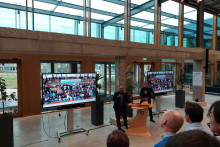´It´s challenging just to study at a university, not to mention being in a foreign country. We want to see if international students are provided the right information, so we can support them. Ultimately, we always want a happy community at the campus,´ Chang explains the main purpose of his work.
Why did you decide to come to the University of Twente?
´The UT and the University of Melbourne have a partnership for student exchange and also staff mobility. I came here to see how we could enhance this collaboration. I was also invited to participate in CuriousU, which I really enjoyed. And this visit also gave me the opportunity to compare my existing research with a sample of international students in the Netherlands.´
What is the goal of your research?
´This project is a part of a bigger research focused on information seeking behavior and online behavior. Here in Twente, I´m conducting a research on how ´International students use their social networks and use information while they are in the Netherlands.´ To do that I´m organizing small focus groups, which people can still join. I want to find out if online behavior of international students changes once they move abroad - where they look for information about studies, health, accommodation etc. In Australia we have done a large-scale survey of 6000 students, but now the question is if international students in Europe have the same experience as the ones in Australia or the US.´
What are your findings so far?
´International students generally don´t rely on sources of information from the host country, where they study. They use sources from their home countries. Although they live here, they live in their home country at the same time, reading news from home, not Dutch news etc. They only use the university websites to find out details related to their studies, but little else, even though the website often contain information about health or accommodation as well.´
´The international students here at UT have also complained about Dutch doctors. They generally said that Dutch doctors don´t help you until you are ‘nearly dead’. I don´t know if that is true, but it is their perception. Is that because of lack of understanding and communication? It is important to understand these things, so we can help the students. We want them to be successful and integrate.´
Do they integrate?
´In some cases, international students don´t feel like part of the local community. One of the reasons is that Dutch students are more comfortable speaking Dutch, even though they speak English. Because of this international students, who usually don´t speak Dutch, talk mainly to each other, so they form social networks with non-Dutch students or with people from their home country. That leads to separate communities being formed at the campus. This is not unusual and happens a lot in many countries that host international students.´
If you´d like to participate in Shanton Chang´s research at the UT, you can still join a group interview on the 26th of August 2015. For more information please contact Inge Broekman ([email protected]).







